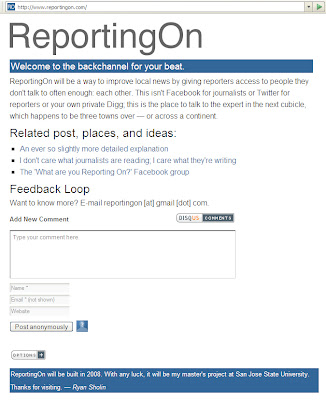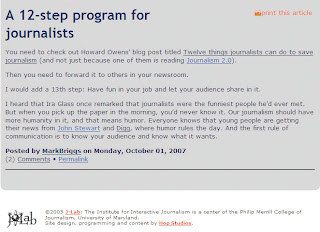“Bringing journalists together in a more organized way online” seems to this week’s theme.
I posted an item Tuesday about journalist/blogger Ryan Sholin‘s ReportingOn concept for a Web site, where reporters could discuss what they are covering. Today, I received a PoynterEvolution column by Interactivity Editor Ellyn Angelotti announcing Poynter Online’s plans for groups — a feature I first learned of by looking at one of their Web redesign concept images.
Of course, I’m all for connecting journalists and getting them talking. Communication is the name of our game. If we can’t communicate and interact well with each other as journalists, what does that say about our ability to do the same with readers?
name of our game. If we can’t communicate and interact well with each other as journalists, what does that say about our ability to do the same with readers?
Below is an excerpt of the column, click here for the full version.
“When we asked users last year how much they care about connecting or reconnecting with colleagues, we were surprised at the high level of interest. Maybe we shouldn’t have been. When we set up a page on Facebook called “Journalists and Facebook,” hundreds of you joined right up and more than 5,700 belong today.
That kind of response — and the need it suggests — is driving the creation of a network of our own — Poynter Online Groups. Not exactly social networking, not exactly professional networking, Poynter Groups represents our effort to tailor something special for the Poynter Online audience. We’ll differentiate our service from others you may belong to by keeping journalism at its center — especially content created by you and resources produced by Poynter faculty and staff. “
Weigh in: Do you use Facebook and other social networking sites to discuss journalism? Would you use Poynter’s groups? Would you stop using the other ones if you did?



